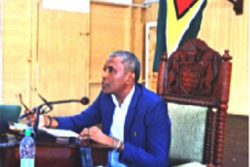Guyana and Georgetown in particular seem to be slowly sinking beneath a mountain of rubbish. Fly-tippers and litterers have come to dominate our civic existence, and the authorities who have the obligation to keep our public spaces clean seem to have abandoned their responsibilities. Periodically senior officials in the company of community-minded citizens descend on an area and effect a major clean-up, but while this does wonders for this or that leader’s public image, it does nothing to solve the underlying problem. Within days the customary garbage will have returned.
It was a point made by the Private Sector Commission recently: “One day there would be a cleanup, and the next couple days people gone right back to littering,” said its Chairman Komal Singh. The PSC had various suggestions for alleviating the problem, one of which related to the littering law. Given the amount of garbage everywhere, the Commission inevitably questioned the level of enforcement which was being done. It was a question which hardly required a formal answer; people dump rubbish because there are no consequences for them doing so.
The PSC also announced it would donate 150 drums to the City Council which it could distribute across Georgetown so people would have somewhere to throw their litter when outside. However, as was noted in our report on its proposals, while citizens complain that there is often nowhere to throw their rubbish, when there are bins available they frequently ignore them.
Mr Singh did recognise that maintaining a clean environment had to become the culture of Guyanese, although it might be observed that we are clearly a very long way from achieving that aim. The Commission he heads has an especial interest in clean surroundings being maintained, in view of the country’s development and the fact it is opening its doors to international visitors and investors.
The Public Service Commission can exhort, complain and donate bins and the like, but it has no direct control over garbage matters; in Georgetown that is the province of the City Council. Whether or not in relation to what the PSC said, on Monday Georgetown Mayor Alfred Mentore expressed his concern at a statutory meeting over the garbage collection problems besieging the city. It was the first time citizens had been given some inkling of how the system, such as it is, works.
One might have thought that given the state of the city he would already be familiar with the details of the cleaning regimen and the impediments to its implementation, but if he didn’t before, at least he knows now. Town Clerk Candace Nelson told him after he enquired that the city lacks an evening clean-up crew owing to the fact the Solid Waste Department was significantly understaffed and so could not support night-time garbage collection.
She added that the sanitation workers were members of the Guyana Labour Union, which made it difficult to implement a shift system or introduce overtime work. That, she said, would necessitate negotiations with the union.
The Mayor then indicated he was willing to meet with the union on the matter of the escalating garbage problem, which he described as a situation of urgency.
Mr Mentore had earlier questioned Deputy Solid Waste Director Floyd Rollins about the varying quality of waste management across different areas, some of which were serviced daily and others where the garbage just piled up. What emerged from that exchange specifically was not clear, but Mr Rollins did enlighten him on related matters. Garbage collection, he said, had been further impeded by the early closure of dumpsites and the shortage of workers for the purposes of late pick-ups.
Mr Mentore’s next move was something which should have been done years ago: he requested that Mr Rollins prepare a comprehensive document setting forth workers’ schedules currently, dumpsites’ operating hours and a map of those areas affected by irregular garbage collection. This could form a basis for discussions with the unions to effect necessary changes to the system, he said.
This is a good starting point, but there are some things, perhaps, which it may not be within his ambit to change. If a serious shortage of workers continues, then more frequent pick-ups cannot be organised. One suspects that the City Council cannot attract people to take up what is, after all, an unpleasant job with low wages. In order to get more workers they would have to pay more money.
Which brings us to the problem of the government which simply wants an APNU-controlled council to fail. It knows very well that the M&CC does not have the resources to discharge its duties in the way it is required to do, but still it refuses to pay its debts to the Council or update the property tax, among other things. Which is not to say that the City Council is a model of order, planning or efficiency ‒ far from it. But if we want a clean city, and citizens do, the government needs to co-operate with the Council to see how that best can be achieved.
The Council too does not have control over dump-site hours, something which might also require government intervention.
And as for the PSC’s belief that before there would be improvement in people’s habits, then the littering laws would have to be enforced, it might have an impact if done systematically. The problem is it would depend on the City Constabulary – a poorly performing institution, if ever there was one – and the police, who can’t even enforce the traffic laws, let alone those they currently don’t even bother about. In addition, of course, it would also presuppose that rubbish in all areas of Georgetown was being regularly collected.
At the bottom of all this, everyone is tired of the political games. Georgetown is our capital city and the thousands of residents who live there want an environment which is sanitary, tidy and orderly. Is it really too much to ask the central administration to work with the local one to achieve that end?






